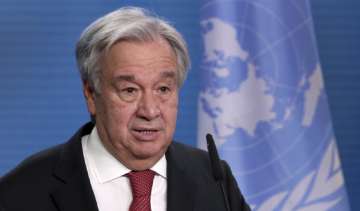Antonio Guterres to seek second five-year term as UN Secretary-General
Guterres assumed office on January 1, 2017, after a reformed selection process that included a public informal dialogue session in the General Assembly, involving civil society representatives, where each of the 13 candidates presented vision statements and took questions.

UN Secretary-General Antonio Guterres has said that he will be seeking a second five-year term as chief of the world organisation. President of the General Assembly, Volkan Bozkir, had enquired last Friday about Guterres' intentions regarding a second mandate. “The Secretary-General conveyed to him today that he is available to serve a second term as Secretary-General of the United Nations if that would be the will of the member states,” UN spokesperson Stephane Dujarric said at the daily press briefing on Monday.
Dujarric said the Secretary-General also addressed a letter of similar content to the President of the Security Council.
In accordance with Article 97 of the UN Charter, the appointment of the Secretary-General is made by the General Assembly, on the recommendation of the Security Council, which in effect means that any of the five permanent members can veto the nominee. Each Secretary-General has the option of a second term if they can garner enough support from member states.
The term of the next Secretary-General will begin on January 1, 2022.
Guterres assumed office on January 1, 2017, after a reformed selection process that included a public informal dialogue session in the General Assembly, involving civil society representatives, where each of the 13 candidates presented vision statements and took questions.
Dujarric said the UN chief had informed the Security Council, and the heads of regional groups of his decision, and that it was too early to gauge any reaction from member states at this stage or speculate about any other potential candidates.
“The Secretary-General will be in the hands of member states on the process, and the Secretary-General will, of course, fully meet any expectations expressed by the General Assembly on submission of a vision statement, opening himself to question sessions, but he is a candidate. Those who organise the process, the member states will have to talk to you about the next steps,” he said.
When asked if Guterres' announcement to seek a second term depended on the US election, Dujarric said the Secretary-General wanted to be as transparent as possible.
“I don't think any particular election cycle in any particular country impacted his decision,” he added.
Dujarric said Guterres spoke to the President of the General Assembly first and then informed the five permanent members of the Council as well as heads of various regional groups, political groups over the weekend “to make sure everybody had the same information”.
Brenden Varma, the spokesperson for President of the General Assembly, confirmed that the presidents of the Assembly and the Security Council would be discussing the Secretary-General selection process, at a regular meeting on Tuesday.
The next move to formally kickstart the process will be a joint letter from the two presidents sent to member states.
In response to questions, Varma noted that under the new “inclusive and transparent” selection process begun in 2016, “this is the first time that we have actually seen an incumbent” put themselves forward for re-election, and more details would be forthcoming later in the week.
Human Rights Watch (HRW) said whoever assumes the role of the UN chief, after Guterres’ first term ends on December 31 this year, should fully commit to improving the world body’s performance on upholding human rights and that it's crucial that the selection process is competitive and transparent.
The human rights organisation said Guterres “should not be handed a new term on a silver platter. The process should include multiple candidates who all publicly present concrete plans to improve the UN, including how to reinforce its human rights pillar at a time when some governments are actively working to undermine it”.
HRW said in a statement that Guterres’ performance on human rights over the past four years has been mixed, largely characterised by an unwillingness to publicly criticise rights-abusing governments by name and a preference for closed-door diplomacy.
It said HRW and other organisations have called on Guterres to publicly urge the Chinese government to release over a million Turkic Muslims arbitrarily detained in so-called education camps and appoint an envoy to monitor rights abuses in China, which he has not done.
“The selection of the secretary-general is largely in the hands of the five permanent members of the UN Security Council, as the council nominates a leading candidate for members of the General Assembly to confirm. UN member states should be clear that they will only consider candidates who make credible commitments to resist the efforts of governments seeking to sweep human rights under the carpet,” HRW said.